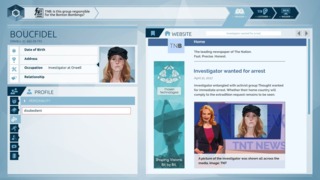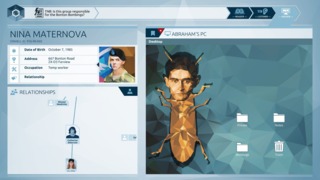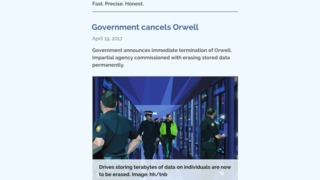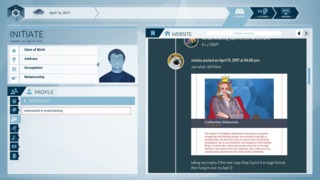Only the people that actually experienced it can judge totalitarianism appropriately, or so it is said at times. Orwell depicts a utopian setting where individual privacy is constantly violated thanks to public cyber-surveillance in form of an eponymous system, and justified through an ambiguous "Safety Bill" that sanctions "investigative methods" in order to "protect the freedom of The Nation's citizens." In spite of those violations it is difficult to see the Government as a real menace for the citizens; there is no dictator oppressing the people with military means, just an overeager Secretary of Security, Catherine Delacroix, using statal measures to supposedly protective ends. Consequently, the second playthrough becomes the more interesting one: to see how the knowledge about the individual characters' degree of criminal implication does retroactively affect your choices at the different decisive moments of the game.

So if during the first playthrough you might have been well-intentioned enough to help the surveillance masterminds spying on your fellow citizens, you might be more inclined to rather try sabotaging the system on second thought, at the risk of course, to become yourself a "target" at the end.
That the game makes you second-guessing your “datachunk” choices is its biggest achievement, but that your superiors leave it entirely to you to distinguish between important and irrelevant information is Orwell's patent weakness since too ingenuous fiction-wise, though you need to contribute pertinent data in order to make the story progress, what can also be taxing at times. Still, however annoying the "targeted surveillance" and however punctually destructive its results, Hitler's and Stalin's totalitarian systems both referred to bold, black-mantled agents rather than invisible cameras to spread their unsubtle terror.

Orwell (the game) wants to show how a statal surveillance system can destroy private lives, for instance that of single mother Nina Maternova, but as to representing the political system as an actual menace for public life, the game falls too short: reality is both better and worse. It is shocking, though, to realize that the monitoring of both telephone and Internet communications is something also the citizens of democratic countries are faced with, and the game does a good job in showing the use of this type of top-down espionage; worse still, it is yourself who is doing that closed-circuit observation with Orwell as your user interface: you may log in and out, but during the story's full five days set to April, 2017, you exist only as an “investigator” reporting to Symes aka Benjamin Costigan, your adviser. Symes introduces you into the basics of your job: only once a person becomes a “target” related data can be extracted from the different documents and uploaded to Orwell's servers, essentially by hovering your mouse cursor over the images and chunks and dragging them to the respective profile.
And so you proceed: you get someone's chat handle from some of their friends' posts or e-mails; thanks to their handle, you find out that they are a user of a dating website; you examine their public profile and conversations and learn that they are a temp worker; from their CV on the temporary jobs website you get their phone number and home address. From another chat you retrieve their PC's unique ID (or IP); connecting to their desktop you then learn some of their privatemost details which allows you to find the motivations for an alleged terrorist activity...

Your selective choice is all that matters for the course of the story: not that you were able to change the facts or to manipulate them, but you can consciously mislead your supervisors by leaving out potentially incriminating information. For instance, if they are not aware of the hostile anti-government stance of the suspected person, they might proceed differently than knowing all the details. But then, why, on your first playthrough, would you mistrust an elected government in favor of someone like the blue-haired Cassandra Watergate, heir of the important Watergate Pharmaceuticals group dropped out of her COO responsibilities to become an activist artist? Or some Abraham Goldfels—kinsman to 1984's Emmanuel Goldstein—Stelligan University's well-reputed Media Ethics professor and The Thought founder, but as turns out, oblivious of his pre-immigrant past and by the time you start the investigation already gone? “For, after all, how do we know that … the past is unchangeable? If both the past and the external world exist only in the mind, and if the mind itself is controllable—what then?” (George Orwell, 1984)
Still, if Orwell's storyline allows for different decisions and outcomes, it is not the story background itself that changes nor its facts, it is just the gained knowledge of it that does alter your conscience and hence, your attitude: "Sometimes their truth and ours have to divert, for the common good..."

All this the game does amazingly well: the approach might be simplified but it likely is how tracking persons in the Cyber Era does work, even when using a variety of sites, personas, and devices. This way the very conflict between public security issues and private data protection is well laid out, though disparaging the sole person of Mrs. Delacroix won't do the system as such much harm, and it is surprising that Prime Minister Blaine himself doesn't get more attention than a couple of news headlines: neither his meeting with the crisis-riddled Pargesian president Demjan Kassart, nor The Nation's conflicted relationship with its neighboring countries in general seems to have much impact on the investigation, apart from the one suspect's past Army enlistment and the other one's fashionable charity activity.
But this might be stuff for a sequel; the virtue of this first installment of Orwell is that it makes you rethink, if not doublethink, your appraisal though the political context as such, albeit topical, appears far less preoccupying than in the famous Orwellian dystopia. The five different episodes can be replayed separately for the different endings, though repeatedly going through the same dialogues quickly loses its interest during replay. Still, the second playthrough will be the better, for more conscientious one: after all, how do we know that two and two make four?

